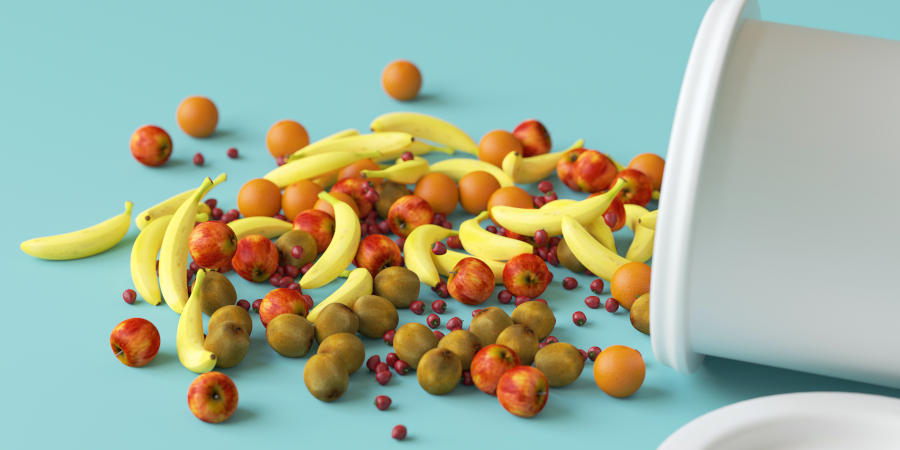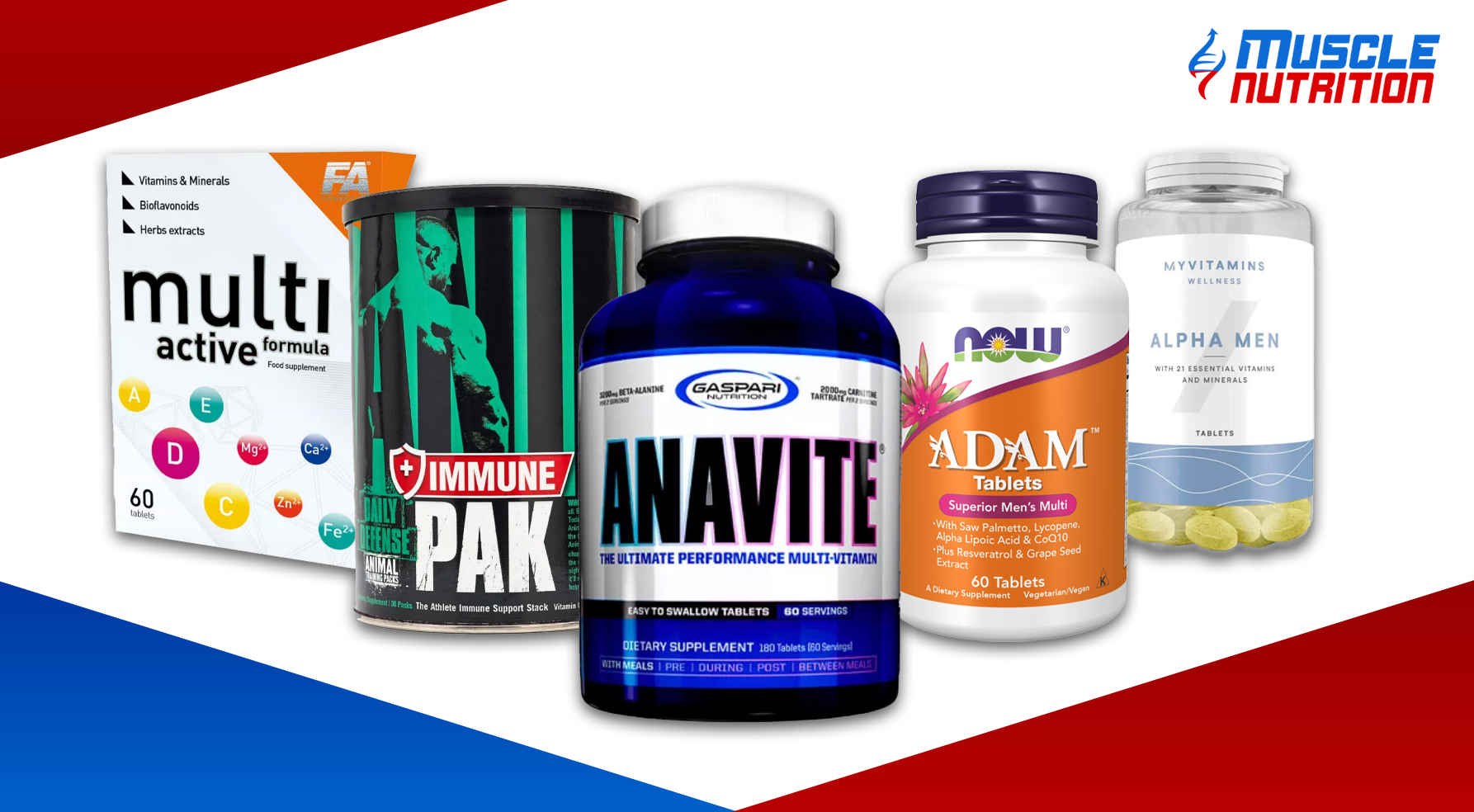Vitamins in Sport

Le Vitamins are essential for our body to function properly and prove to be fundamental in particular for sportsmen. It's about elements cannot be synthesized directly by the body and it is therefore necessary to introduce all the various types of vitamins through the diet.
Unfortunately, the foods we eat on a daily basis fail to provide the necessary supply of the full spectrum of vitamins we need: we can't find the right variety or quantity. For this reason it is important learn about vitamins and take supplements to avoid deficiencies which could consequently reduce the efficiency of metabolic reactions essential for fitness and health.
In this article we will analyze the importance of a higher vitamin intake for sportsmen and we're going to dissect the various vitamins and theirs benefits for our health and for our muscles.
WHY A GREATER VITAMIN INTAKE IS IMPORTANT FOR ATHLETES
Vitamins play an essential role in the proper functioning of the organism of all human beings, but in particular they prove to be of fundamental importance for both sedentary people both for Sports, as they play an indispensable role for the development of physiological functions.
Vitamins are especially essential for:
- The correct assimilation of the various nutrients;
- The realization of various metabolic reactions, such as building skin, muscle and bone;
- The production of energy available in the body.
Those who practice strength sports and sportsmen in general have a higher energy requirement. Indeed, people who train intensely or regularly mobilize their vitamin reserves to a greater extent than others. For this reason, athletes are generally always in one vitamin deficiency situation, especially if they follow a low-calorie diet.
However, this shortage situation is not good, as vitamins are essential in order to maintain optimal physical performance. This is because they help strengthen our immune system and from better combat oxidative stress which is produced during workouts.
Therefore, integrating vitamins turns out to be really important for athletes to maintain good health, limit nutritional deficiencies (always respecting an adequate diet) and migliorare the prestazioni.
THE BENEFITS OF VITAMINS FOR SPORTSPEOPLE

We all have to avoid vitamin deficiencies, but athletes more than others need to integrate these elements in order to enjoy the beneficial effects that each different vitamin can bring to their health and performance.
Each type of vitamin has its own specific characteristics and his particular benefits; it is important to know all these different types to better understand how they can help us and which are the ones to be made to a greater extent through supplements.
The most important vitamins for the health and performance of athletes are: vitamin A, B vitamins (B1, B2, B3, B5, B6, B8, B9, B12), vitamin C, vitamin D, vitamin E and vitamin K.
Let's look at these vitamins one by one:
- Vitamin A: it is a fat-soluble vitamin, meaning that it can be stored in body fat and therefore does not need to be taken daily through food. It is essential for promoting growth, the immune system and vision. This vitamin is particularly important for sportsmen, as it has an antioxidant power that allows you to strengthen the immune system and to better counteract the oxidative stress deriving from workouts, due to the production of free radicals. Vitamin A intervenes in this process as a sort of protective shield against free radicals and therefore allows athletes to be able to maintain optimal performance in the long term;
- Vitamin B1 (Thiamine): this vitamin is water soluble, i.e. it cannot be stored by our body and it is essential to introduce it through nutrition or supplementation. Vitamin B1 is involved in energy metabolism, carrying out the fundamental action of helping to convert glucose into energy. Furthermore, optimal levels of this vitamin promote good neurological functioning;
- Vitamin B2 (Riboflavin): this vitamin also intervenes in energy metabolism and also has antioxidant properties;
- Vitamin B3 (Niacin): it is a vitamin that plays an essential role in the cellular energy production process, but also acts as a vasodilator for blood vessels. Vitamin B3 also has the ability to lower the level of homocysteine and therefore decrease the risk of developing heart disease. This vitamin also helps reduce bad cholesterol in the blood, while simultaneously increasing the good one;
- Vitamin B5 (Pantothenic Acid): it is a vitamin that plays an essential role in the metabolization of nutrients and also in the synthesis of Acetylcholine, which is a neurotransmitter that allows muscle contraction;
- Vitamin B6 (Pyridoxine): this vitamin is responsible for carrying out more than 100 enzymatic reactions related to protein synthesis;
- Vitamin B8 (Biotin): it is a vitamin that deals with the metabolization of fatty acids and glucose, important elements for carrying out resistance exercises;
- Vitamin B9 (Folic Acid): it is an essential element to allow the normal formation of red blood cells and DNA. Optimal levels of Vitamin B9 also allow the correct oxygenation of muscle tissue and therefore allow us to maintain good physical performance;
- Vitamin B12: this vitamin favors the reduction of oxidative stress and therefore also the improvement of recovery for sportsmen. Vitamin B12 also helps to maintain good cardiovascular health, thanks to its regulating action on the level of homocysteine in the body. moreover, this vitamin also has a protective role for the nervous system, as it brings benefits to nervous regeneration;
- Vitamin C: it is a water-soluble vitamin well known thanks to its antioxidant power and protective effects for the immune system. Vitamin C is also essential for the synthesis of carnitine, collagen and various neurotransmitters, which are all essential elements for sportsmen;
- Vitamin D: this is a fat-soluble vitamin and can be obtained through exposure to sunlight; for this reason it must be integrated especially in the winter months. Generally sportsmen are deficient in vitamin D, but they really need it a lot since it is related to the production of testosterone, it helps the development of greater physical strength during workouts and stimulates fat loss;
- Vitamin E: this vitamin is fat soluble and is stored in adipose tissue and muscles. It is a vitamin known for its antioxidant power, as it plays an important role in the protection from free radicals. It allows athletes to better resist efforts and recover better after workouts. Vitamin E helps us minimize DOMD, or soreness related to physical effort, and reduce muscle degradation. It also helps us protect the nervous system and strengthen the immune system. Therefore, thanks to all these benefits, vitamin E actively participates in improving sports performance;
- Vitamin K: There are two types of this vitamin, namely K1 and K2. Both of these vitamins are essential, but K2 especially, as it strengthens bones and helps us fight joint pain and inflammation.
THE ROLE OF D3 IN THE SYNTHESIS OF TESTOSTERONE
La vitamin D3 is a fat-soluble vitamin, meaning it is stored in adipose tissue, and it is the only vitamin that our body can produce through exposure to sunlight. However, at least 30 minutes of daily sun exposure would be needed and for this, especially in the winter months, it is important to take it through food or supplements (here you find the best vitamin D3 and K2 supplements)
Vitamin D3 mainly takes care of the maintaining the normal functionality of our immune system, muscle trophism and bone health. However, recent studies have shown an influence of this vitamin on the production and presence of testosterone in the blood.
This happens because vitamin D3 is capable of decreasing the presence of Sex SteroidHormone-BindingGlobulin (SHBG), i.e. a molecule which, if present in excess, retains free testosterone, thus making it less bioavailable.
So, with a reduction in SHBG levels, we can increase free testosterone levels and all the benefits related to it.
BUT BE CAREFUL NOT TO EXCEED (CONTRINDICATIONS AND SIDE EFFECTS)
- multivitamin supplements they are therefore a product that we all should have at home ed take cyclically during the year. Sportsmen, in particular, have a greater need for vitamins due to the many benefits they bring to sports performance, but also to the health of muscles, bones and the body in general.
However, even these supplements, however natural and beneficial, they are not without side effects when taken in excess. Like all things, even for multivitamins the rule of never overdo it.
Indeed, a surplus of vitamins due to the use of supplements can lead to side effects such as stomach discomfort, diarrhoea, vomiting, constipation, weight loss or headache. Indiscriminate use of these supplements can also lead to more serious consequences.
Also, the consumption of multivitamins can give interference with some drugs. For this reason, we always recommend contact your doctor before starting any supplements.
To conclude, vitamin supplements are a powerful ally to always keep by our side, being careful however to make it one conscious use and measured to our needs, without ever falling into unnecessary and dangerous excesses.
No messages found
Write a review